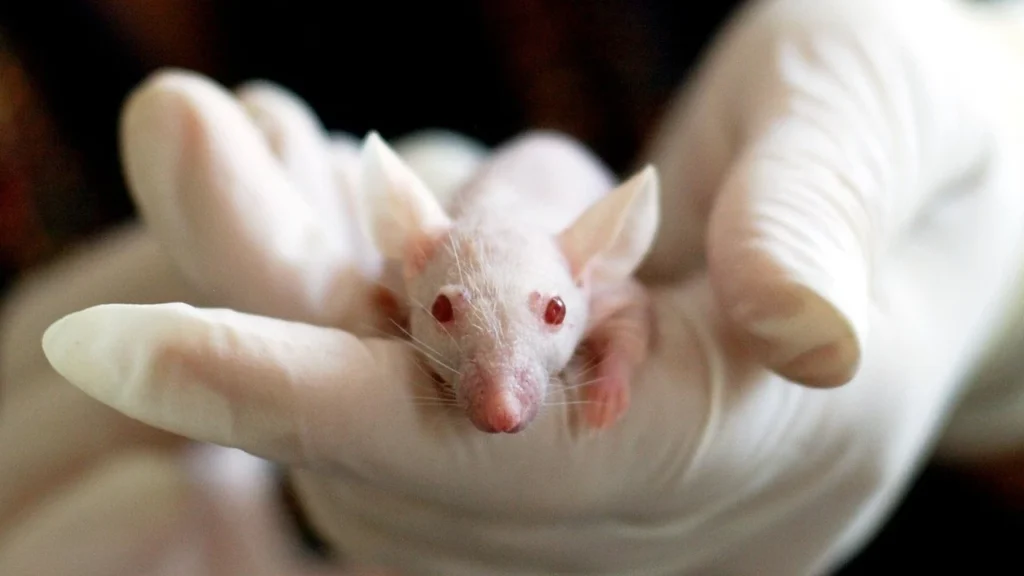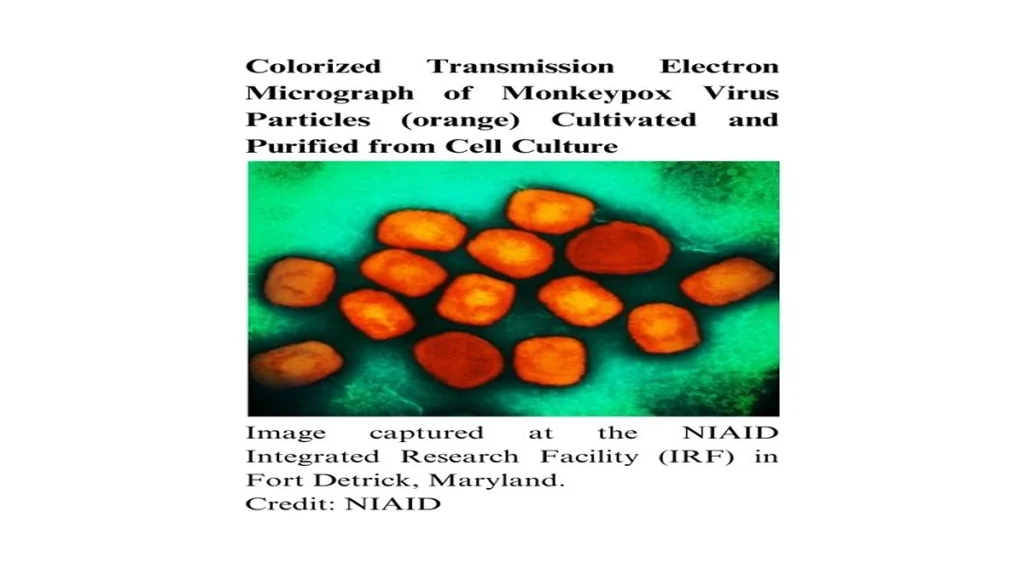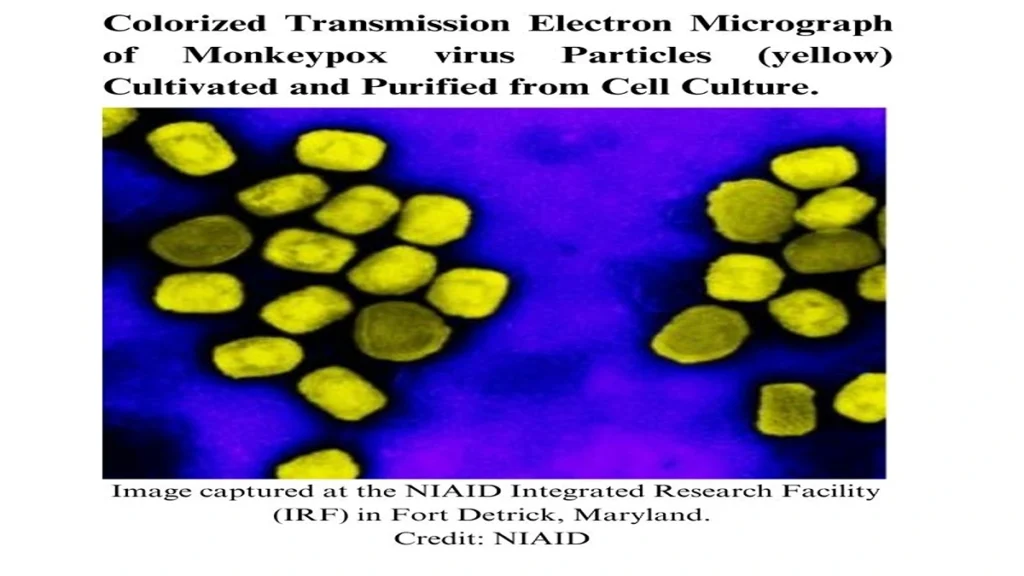“Monkeypox virus can cause an extremely painful infection that lasts for weeks,” said NIAID Director Anthony S. Fauci, M.D.
In order to advance in monkeypox diagnosis and treatment research National Institutes of Health (NIH) has made three recent advances which are described as under
Scientists Developed Mouse Model to Study Monkeypox Virulence at National Institutes of Health
February 14, 2023

NIH scientists from NIAID has achieved a milestone to better understand monkeypox virus and monkeypox diagnosis and treatment by developing a mouse model of the disease. They were able to demonstrate clear differences in virulence of monkeypox major genetic groups or Clades. This research was headed by Bernard Moss, M.D., Ph.D., chief of the Genetic Engineering Section of NIAID’s Laboratory of Viral Diseases.
Monkeypox was a disease resembling with smallpox prevalent in African countries with occasional transmission from rodents to non-human primates or humans. The pattern of disease transmission changed in 2022 when outbreak occurred spreading monkeypox through human to human transmission in more than 100 regions worldwide. Till date 87,078 cases has been confirmed worldwide in regions with no background of monkeypox outbreak.
Current outbreak is due to clade IIb as revealed by genome sequencing. clade IIb differs from two historic clades including clade I having mortality rate of up to 10% and clade IIa, having mortality rate of less than 1%. Mortality rate of clade IIb is lower than clade I and clade IIa.
Standard inbred laboratory mice are resistant to monkeypox virus infection therefore lack of animal model made it difficult to study genetic variations among different variants of monkeypox. Dr.Bernard Mossalong with his colleagues discovered a strain of wild-derived inbred lab mouse (CAST/EiJ) which can be infected with monkeypox virus in monkeypox diagnosis and treatment research to develop mouse model.
Similar to humans clade I was the most virulent in CAST mice and followed by clade IIa and clade IIb. In mice model clade IIb virus was 100 times less virulent than clade IIa virus due to very low viral replication and lower virulence than clade I and clade IIa. Mortality rate was zero percent due to clade IIb infection in mice despite exposure to high doses of infectious virus. Researchers concluded that the clade IIb is evolving, diminished virulence or adapting to other species.
Clinical Trial on Evaluation of Antiviral Drug Tecovirimat (TPOXX) for Monkeypox Treatment at National Institutes of Health
September 9, 2022

National Institute of Allergy and Infectious Diseases (NIAID) which is a part of the National Institutes of Health has funded and started a Phase 3 clinical trial for evaluation of antiviral drug tecovirimat (TPOXX) as part of monkeypox diagnosis and treatment research. In this trial NIH is now enrolling children and adults with monkeypox virus infection in the United States. They aim to enroll >500 patients from clinical research site in the country. This study on monkeypox diagnosis and treatment research is led by the NIAID-funded AIDS Clinical Trials Group (ACTG) and later on it may expand to international sites.
Tecovirimat, drug of choice for smallpox, is approved by the U.S. Food and Drug Administration for monkeypox treatment. The drug was manufactured by the SIGA Technologies, Inc., New York City. This antiviral drug targets a protein found on both variola viruses causing smallpox, and the monkeypox and prevent virus from exiting infected human cell ultimately preventing virus from spreading in the body.
Due to lack of sufficient data about the mode of action of drug on monkeypox symptoms this clinical trial was designed to understand how this drug mitigates monkeypox symptoms.
In May 2022, monkeypox outbreak of humans identified first time and declared as public health emergency by World Health Organization (WHO) and the U.S. Department of Health and Human Services. Majority cases reported in male homosexuals although other population like women and children may get infection. Until now 87,078 cases has been confirmed worldwide in regions with no background of monkeypox outbreak. Preliminary analyses of reported cases indicate that sexual transmission may be playing a role in the current outbreak.
Timothy Wilkin, M.D., professor of medicine at Weill Cornell Medicine in New York City is heading the clinical trial of tecovirimat in the United States. Adult and children of any age can enroll in the trial specifically people with immune deficiency, individual with active inflammatory skin condition, pregnant women. In this trial all participients will be enrolled in an open label arm and receive tecovirimat..
Other adult participants enrolled in monkeypox diagnosis and treatment research (530 total) will be randomly assigned in a 2:1 ratio to take tecovirimat or placebo pills. Tecovirimat capsules are taken orally for 14 days at dose rate depending on weight of participant.
This trial on monkeypox diagnosis and treatment will be double blind, both researcher or the participants enrolled in monkeypox diagnosis and treatment research will be unaware of the fact that who is receiving placebo or tecovirimat. Researchers will collect the data of participants, enrolled in monkeypox diagnosis and treatment research, receiving tecovirimat treatment who heal quickly and all their lesions flaked off comparative to those participants taking placebo treatment.
They also will examine
- Impact of tecovirimat on pain scores
- Rates of progression to severe disease
- Clearance of monkeypox virus from different samples, and
- Tecovirimat safety
This trial on monkeypox diagnosis and treatment will also provide critical data on dose rate and safety of the drug in children and pregnant women. Participants enrolled in monkeypox diagnosis and treatment research will be followed for 8 weeks, will be asked to fill out a symptom diary, do daily skin checks at home and attend virtual and in-person clinic appointments. They will be physically examined and they will be asked to provide blood and other bodily fluid samples like swabbing fluid from their skin lesions.
All data on the safety and efficacy of tecovirimat drug will be submitted to the FDA to further improve monkeypox diagnosis and treatment research.
Treatment Trial to Evaluate Tecovirimat (TPOXX) for Monkeypox in the Democratic Republic of the Congo -NIH Partnering with INRB
October 12, 2022
“Monkeypox disease resulted in high burden of disease and death in children and adults in the Democratic Republic of the Congo, therefore improved treatment options are urgently required” said NIAID Director Anthony S. Fauci, M.D

The trial will evaluate the drug’s safety and its ability to mitigate monkeypox symptoms and prevent serious outcomes, including death. The National Institute of Allergy and Infectious Diseases (NIAID) which is part of the U.S. National Institutes of Health, and the DRC’s National Institute for Biomedical Research (INRB) has collaborated a trial as part of the government-to-government PALM partnership to advance in monkeypox diagnosis and treatment research.
Collaborating institutions to work in collaboration for monkeypox diagnosis and treatment research include
- The U.S. Centers for Disease Control and Prevention (CDC)
- The Institute of Tropical Medicine Antwerp
- The aid organization Alliance for International Medical Action (ALIMA) and
- The World Health Organization (WHO)
The trial on monkeypox diagnosis and treatment is led by co-principal investigators
- Jean-Jacques Muyembe-Tamfum, M.D., Ph.D., director-general of INRB and professor of microbiology at Kinshasa University Medical School in Gombe, Kinshasa; and
- Placide Mbala, M.D., Ph.D., operations manager of the PALM project and head of the Epidemiology Department and the Pathogen Genomic Laboratory at INRB.
This trial will enroll up to 450 confirmed monkeypox adults, children and pregnant women. All participants will receive either oral tecovirimat or placebo capsules twice daily for 14 days, with the dose administered as per participant’s weight. The trial is double-blinded, so participants and investigators both will be unaware of the fact that who is receiving tecovirimat or placebo enrolled in monkeypox diagnosis and treatment research.
All participants will be admitted in hospital for 14 days along with supportive care and they will be kept under observation and be asked to give blood, throat swab, and skin lesion swab samples for laboratory evaluations. This trial will be comparative to evaluate average time of healing between placebo or tecovirimat treatment. It will also provide multiple secondary objectives, including comparisons of how quickly participants test negative for monkeypox virus in the blood, overall severity and duration of disease, and mortality between groups as part of monkeypox diagnosis and treatment research.
After the participant test negative, for two days in a row, for monkeypox and all lesions scabs heal and flake off, participants will be discharged from the hospital. They will be followed for 28 days and be asked to come for study visit, clinical checkup and laboratory tests after 58 days.
All data on the safety and efficacy of tecovirimat drug will be submitted to the FDA to further improve monkeypox diagnosis and treatment research.